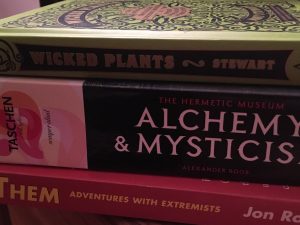Most of us like to think that we are rational beings—that we make decisions on the basis of factual information, interpret observations through an accurate lens, and draw conclusions that reflect the reality of the natural world.
We like to think that in life, but in fiction we seem to favor the magical, spiritual, and otherworldly over the cold, hard facts. I’ve noticed that in stories when a rationalist is pitted against a person with a spiritual, religious or fanciful inclination—the magical perspective beats the rational. Even an emotionally or socially adept person beats the true rationalist in fiction. There’s an allure to the irrational perspective and we all seem to love it!
When you compare Spock to Kirk, I’d say there are a lot of Spock fans in my acquaintance, but when the two go head-to-head, the emotionally developed (psychologically aware and socially adept) Kirk is right more often than the Vulcan rationalist. So much so, that Spock is at his best—and most appealing—when his human side surfaces and undermines his rational point-of-view. We root for the irrational, because it’s an appealing point-of-view.
The same can be said for Sherlock Holmes in most of his incarnations. We love Sherlock and know that his superior mind gets the right answer to any and all puzzles, but his rationalism—his cool intellect—needs the counterweight of Dr. Watson’s soft, emotional, ability to connect with people in order to succeed in the world beyond the solution of a crime. Sherlock observes and processes the minute and illusive facts he amasses, to draw specific, accurate conclusions. But he needs his friend to function in the world. In the originals, Watson is a true ‘kindly doctor’ characterized by empathy and conventional beliefs in God, Country and the innate goodness of humanity.
The allure of the irrational, magical & spiritual comes up all the time in fiction. The cool, rational, character—with an admirable mind and a grasp of the facts—the star detective, top scientist, successful tech innovator, etc.—fights the irrational, magical, spiritual & sometimes religious, inclinations of the less educated, less intellectual, but the more emotionally developed characters. The latter always comes off as superior in the end because they believe in something larger than the facts. It could be God. It could be mythical creatures. It could be magical spells, voodoo curses, or just the power of luck.
In real life we say that we care about rationality, intellect and facts, but in fiction we seem to prefer the magical difference, we root for the vampire hunter, the amateur wizard, the Ouija board messages, the deus ex machina… They all work so well in fiction because we are intoxicated by the allure of the irrational.
We love magic!






I have that Wicked Plants book too!
And you’re right, as much as humans like to operate under logic (I know I do), sometimes it’s the instinctive, almost primal side of the person that understands a situation better.
YES!
Sometimes the primal, instinctive side understands more. Sometimes, it just deludes us with magical thinking. Either way, the magic in magical thinking is appealing, comforting and makes for great fiction.
Glad to see I’m not the only collector of books on odd subjects that inform and infuse my writing.
I can’t say I disagree, but reading it spelled out like this makes me despair of humanity. Why does empathy and emotional connection have to be paired with the supernatural? Lizard brain in the ascendant I guess. 🙁
Personally, I don’t believe that they have to be linked, but in fiction they always seem to be. This is something I keep observing. I’m “all in” with the rational character, but in the end of the story the character with a higher power, magical inclination or supernatural bent always seems to come out ahead. It’s often a simplistic “woo hoo” at the end of a story, but it’s so often present, I just had to blog about it.
I don’t despair for humanity, I just worry about the political implications. Being a rationalist at heart, it makes me feel like an outsider. Of course, it’s not the only context in which I feel outside the “norm.”
This post makes me smile. I try to be this rational, analytical human being but more often than not people tell me I have wicked accurate intuition, and I’m learning to trust it more all the time.
Intuition! I love it. In the larger—rational—picture, it is our innate ability to put illusive bits & pieces of information together and come to a correct conclusion OR it’s magic. If you have a wicked accurate intuition, then you are wicked smart and observant in my book. You’re a magical creature from the opposite perspective. Either way, trust it!
Over and over again, I’m struck by how often we favor the magical thinkers, the spiritual and religious over the rationalist in fiction, while in the confines of real life we look for the rational, logical, authoritative voice. Why is there a gap between who we trust? I’m not sure. I just keep stumbling upon it.